FACULTY MENTORS
- Dr. Feng Gu [2016, 2017], system modeling and simulation, homepage
- Dr. Louis Petingi [2015, 2016, 2017] network reliability, homepage
- Dr. Shuqun Zhang [2015, 2016, 2017] image processing, homepage
- Dr. Xiaowen Zhang [2015, 2016, 2017], cryptography, homepage
- Dr. Zhanyang Zhang [2015], sensor networks, homepage
Dr. Feng Gu
 Feng is currently an Assistant Professor of Computer Science at College of Staten Island, The City University of New York. He received his B.S. degree in mechanical engineering from China University of Mining and Technology and M.S. degree in information systems from Beijing Institute of Machinery. He obtained his M.S. and Ph.D. degrees in computer science from Georgia State University. His research interests include modeling and simulation, complex systems, and high performance computing. He is a recipient of Natural Science Foundation Research Initiation Award from 2013 to 2014. He was an Assistant Professor of Computer Science from 2010 to 2013 and the Chair of Department of Computer Science and Mathematics from 2012 to 2013 at Voorhees College, Denmark, South Carolina. Please visit his homepage.
Feng is currently an Assistant Professor of Computer Science at College of Staten Island, The City University of New York. He received his B.S. degree in mechanical engineering from China University of Mining and Technology and M.S. degree in information systems from Beijing Institute of Machinery. He obtained his M.S. and Ph.D. degrees in computer science from Georgia State University. His research interests include modeling and simulation, complex systems, and high performance computing. He is a recipient of Natural Science Foundation Research Initiation Award from 2013 to 2014. He was an Assistant Professor of Computer Science from 2010 to 2013 and the Chair of Department of Computer Science and Mathematics from 2012 to 2013 at Voorhees College, Denmark, South Carolina. Please visit his homepage.
Dr. Louis Petingi, PI
 Louis is a full professor, and former Chair of Computer Science Department. His research interests are in network reliability and extremal graph theory. In Network Reliability, network components (nodes and communication links) may be subject to random failures, due for example to components wear-out or actions of intentional adversaries. The reliability of a network is the probability that the network withstands these failures. Reliability models are mathematical in nature, based upon Graph Theory, and they are applied to measure performance objectives of Wireless, Optical, and general communication networks. In addition these models are used to find a more reliable network to an existing one, by improving the communication between groups of communication nodes called participating nodes. Louis is also interested in other areas of research including optimization problems in Graph Theory as well as the analysis of RNA structure and function in Biology. Please visit his homepage.
Louis is a full professor, and former Chair of Computer Science Department. His research interests are in network reliability and extremal graph theory. In Network Reliability, network components (nodes and communication links) may be subject to random failures, due for example to components wear-out or actions of intentional adversaries. The reliability of a network is the probability that the network withstands these failures. Reliability models are mathematical in nature, based upon Graph Theory, and they are applied to measure performance objectives of Wireless, Optical, and general communication networks. In addition these models are used to find a more reliable network to an existing one, by improving the communication between groups of communication nodes called participating nodes. Louis is also interested in other areas of research including optimization problems in Graph Theory as well as the analysis of RNA structure and function in Biology. Please visit his homepage.
Dr. Shuqun Zhang
 Shuqun is a full Professor at College of Staten Island and a PhD faculty member at Graduate Center, CUNY. He received his PhD degree in electrical engineering from University of Dayton, his MS and BS degrees in electrical engineering from Xiamen University. He was a visiting faculty research fellow at the Air Force Research Laboratory (AFRL), Rome, NY (summer 2003-2006). His research interests include image processing, computer vision, pattern recognition, digital holography, and optical information processing. Please visit his homepage.
Shuqun is a full Professor at College of Staten Island and a PhD faculty member at Graduate Center, CUNY. He received his PhD degree in electrical engineering from University of Dayton, his MS and BS degrees in electrical engineering from Xiamen University. He was a visiting faculty research fellow at the Air Force Research Laboratory (AFRL), Rome, NY (summer 2003-2006). His research interests include image processing, computer vision, pattern recognition, digital holography, and optical information processing. Please visit his homepage.
Dr. Xiaowen Zhang, Co-PI
 Xiaowen is an Associate Professor at College of Staten Island and a PhD faculty member at Graduate Center, CUNY. He received a PhD in Computer Science from City University of New York and a PhD in Electrical Engineering from Beijing Jiaotong University. His research interests include information security, cryptography, wireless communications, biometrics, and RFID security & privacy. Please visit his homepage.
Xiaowen is an Associate Professor at College of Staten Island and a PhD faculty member at Graduate Center, CUNY. He received a PhD in Computer Science from City University of New York and a PhD in Electrical Engineering from Beijing Jiaotong University. His research interests include information security, cryptography, wireless communications, biometrics, and RFID security & privacy. Please visit his homepage.
Dr. Zhanyang Zhang
 Zhanyang acquired his PhD degree in computer science from the City University of New York. He received a MS degree in computer science from the College of Staten Island and a BE degree in computer engineering from Jilin University, China. He is currently a faculty member of Computer Science Department at both College of Staten Island and Graduate Center, the City University of New York (CUNY). His current research interests include wireless ad hoc networks, sensor networks, RFID and its applications, underwater sensor networks, and mobile computing and database. He is also a visiting professor at several Universities in China, including Hebei University, North China Electrical Power University and Jilin University. Before joining CUNY, he was a member of technical staff (MTS) at Bell Labs, Lucent Technology. He also worked as an IT consultant at different companies in New York City and New Jersey State. Please visit his homepage.
Zhanyang acquired his PhD degree in computer science from the City University of New York. He received a MS degree in computer science from the College of Staten Island and a BE degree in computer engineering from Jilin University, China. He is currently a faculty member of Computer Science Department at both College of Staten Island and Graduate Center, the City University of New York (CUNY). His current research interests include wireless ad hoc networks, sensor networks, RFID and its applications, underwater sensor networks, and mobile computing and database. He is also a visiting professor at several Universities in China, including Hebei University, North China Electrical Power University and Jilin University. Before joining CUNY, he was a member of technical staff (MTS) at Bell Labs, Lucent Technology. He also worked as an IT consultant at different companies in New York City and New Jersey State. Please visit his homepage.
INVITED SPEAKERS & THEIR TALKS
Summer 2016
Dr. Qinghai Gao, Associate Professor, SUNY - Farmingdale State College. Title: Introduction to Biometrics. Abstract: Iris, face, and fingerprint recognition will be introduced, with an emphasis on forensic fingerprint classification and interpretation.
Dr. Ashwin Satyanarayana, Assistant Professor, CUNY - New York City College of Technology. Title: Introduction to Big Data Analytics with two applications (Search Engine Speller and Predicting student academic performance). Abstract: Big data is set to offer tremendous insight with terabytes and petabytes of data pouring in to organizations today. These data present tremendous opportunities in data mining, a burgeoning field in computer science that focuses on the development of methods that can extract knowledge from data. In this talk, we present two applications of big data - Search engine speller and predicting student performance. Search engines such as Google and Bing analyze big data to solve the speller problem by looking at huge volumes of user click data. The first part of the talk addresses this issue. In the second part of the talk, we talk about an emerging interdisciplinary research field also known as Educational Data Mining (EDM). One of the goals of EDM is to better understand how to predict student academic performance given personal, socio-economic, psychological and other environmental attributes. Another goal is to identify factors and rules that influence educational academic outcomes. We address this problem using multiple classifiers.
Dr. Dan McCloskey, Associate Professor, CUNY - College of Staten Island. By studying the African Naked Mole-rat, a unique and highly social fossorial rodent, and harnessing the power of the Interdisciplinary High-Performance Computing Center on the CSI campus. The computer center allows Dr. McCloskey to track the behavior of each of more than 100 animals in his colony with high resolution as they navigate their way through a complex system of tubes and cages. The animals are implanted with RFID tags. Each time an animal passes through a tube with a sensor, the identity, location, and time of that event is stored in a database that receives hundreds of thousands of events each day. Analysis of these large datasets requires the power of a high-performance computer to manage them and ask questions about animal behavior. In this manner, insights into the organized social community will help the researchers to understand how individual differences in social behavior are influenced by physiological and environmental factors and understand the role of social behavior brain systems in health, as well as develop deeper insights into diseases such as epilepsy and autism.
Dr. Yoonsang Lee, Postdoctoral Researcher, New York University - Courant Institute of Mathematical Sciences. Title: Estimation and prediction of complex systems using mathematical models and observations. Abstract : Scientists and engineers use mathematical models to predict and estimate physical systems or complex phenomena. But the models have limited applications mainly due to the fact that they are approximations to the unknown true signal. In this talk I will discuss a method known as data assimilation which combines a mathematical model with observational data of the true signal to improve the estimation and prediction skills. Simple but illustrative examples will be discussed and the current cutting-edge research topics which require collaborations between mathematicians, computer scientists and real application practitioners are also introduced.
Dr. Anand Sarwate, Assistant Professor, Rutgers University. Title: Learning from sensitive data while protecting privacy. Abstract: Personal or sensitive information about individuals is being collected and stored digitally at higher and higher volumes each day. There are many potential benefits from sharing this data: better understanding of medical treatments, improved fraud detection, and personalized recommendations. For many of these applications, the goal is to learn some property of the population (for example, patients with a given health condition), rather than about individuals. Unfortunately, many approaches for data sharing and machine learning may allow inference about individuals even though they are learning from populations. Several methods have been proposed to help protect individual privacy in these settings, from classical statistical disclosure control techniques used by the U.S. Census Bureau, to the more recently proposed differential privacy model, which seeks to quantify the risk of identifying whether any individualís data was part of the data set. In this talk I will describe some of these applications, techniques, and models, and give a brief survey of where privacy-preserving learning seems possible.
Dr. Shiri Azenkot, Assistant Professor, Jacobs Technion-Cornell Institute at Cornell Tech. Title: Designing Technology for People with Low Vision. Abstract: Visual impairments include a range of visual abilities. Many people have low vision, which means they have functional vision but they face visual challenges when performing daily activities. Unlike blind people, low vision people tend to use their vision in their daily lives. Most people with visual impairments have low vision and arenít blind, but there has been very little research addressing this user group. In my talk, Iíll describe low vision and present an overview of the research my group is conducting in this area. We are working on studying the challenges that low vision people face when completing daily tasks such as shopping, and designing smart glasses applications to address these challenges.
Summer 2015
Dr. Anatoly Kuklov, Associate Professor, CUNY - College of Staten Island. Title: What a physicist can learn from supercomputers. Abstract: .
Dr. Raffi Khatchadourian, Assistant Professor, CUNY - Hunter College. Title: Automatic Migration of Legacy Java Method Implementations to Interfaces. Abstract: .
Dr. Li-Chiou Chen, Professor, Pace University. Title: Web Security and User Authentication. Abstract: Web transaction, Encryption, Server authentication, User authentication, Research on alternative ways of user authentication, Pace CyberCorps Scholarship Program.
Dr. Dan McCloskey, Associate Professor, CUNY - College of Staten Island. Title: Social behaviour of naked mole-rats. Abstract: .

